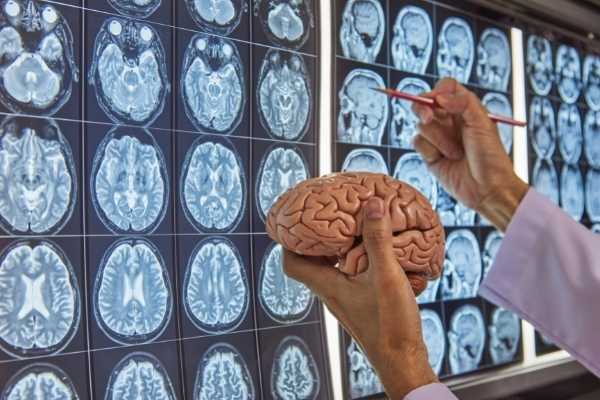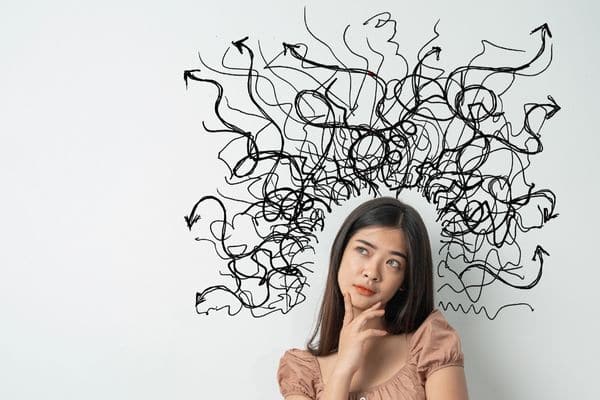Dr. Amen has a different way of looking at adult ADHD, he feels there are 7 types of ADHD. His clinic has developed different treatment regimen for each type of ADHD.
ADHD Diagnosis According to Dr. Amen
The medical model of ADHD is based on symptoms of inattention, impulsivity and hyperactivity and how cause impairments in life. This model diagnoses ADHD based on history, observation and clinical assessments, and currently divides ADHD into 3 types: inattentive, hyperactive and combined.
However Dr. Amen of the Amen Clinic has a different approach to the diagnosis of ADHD.
In addition to personal history and clinical assessments the Amen Clinic uses brain imaging with SPECT scans. SPECT is a nuclear medicine study used to evaluate blood flow and activity in the brain.

Using SPECT scans, the Amen Clinic says they have identified 7 types of ADHD. Each type has its own set of symptoms, and treatment is adjusted based on the type of ADHD.
Who is Dr. Amen?
Dr. Amen is a psychiatrist and brain disorder specialist and director of the Amen Clinics. He is a celebrity physician and is the author of multiple best selling books.
He is well known as an ADHD and brain injury specialist. Dr. Amen works with professional athletes and the National Football League, and has studied brain injuries due to concussion.

Dr. Amen is a controversial figure due to his use of SPECT scans for the diagnosis of ADHD, which the medical community feels that diagnosing ADHD with SPECT scans is not supported by scientific data. Other concerns about Dr. Amen are based on the fact that his clinics are very profitable and that his patients are exposed to a lot of radiation with SPECT scans of unclear benefit.
Dr. Amen is seen as a charletan who profits off of the desperate, and also is viewed as a saviour who helps people with brain disorders when no one else could.
The Amen Clinic’s 7 Types of ADHD
The 7 Types ADHD according to the Amen Clinic are:
- Type 1: Classic ADHD
- Type 2: Inattentive ADHD
- Type 3: Over-Focused ADHD
- Type 4: Temporal Lobe ADHD
- Type 5: Limbic ADHD
- Type 6: Ring Of Fire ADHD
- Type 7: Anxious ADHD

Amen Clinic ADHD Type 1: Classic
The Amen Clinic describes this type as being evident early in life and accompanied by hyperactivity. Children with classic ADHD are restless, impulsive, demanding, noisy, and talkative. This type is noticed early and seen more frequently in boys than in girls.

Symptoms of Amen Clinic’s Classic ADHD:
- Inattentive
- Easily distracted
- Disorganized
- Impulsive
- Poor follow-through
- Trouble listening when others talk to them
- Making careless mistakes/poor attention to detail
- Forgetfulness
- Restlessness
- Being fidgety
- Difficulty awaiting their turn
- Act as though driven by a motor
- Being noisy
- Talking excessively
- Interrupting others
Amen Clinic’s Treatment of Inattentive ADHD
The Amen Clinic uses stimulant medications to boost dopamine levels for classic ADHD. Supplements like green tea and rhodiola and L-tyrosine may also be considered. Exercise is always part of the recommendation to increase dopamine. Fish oil high in EPA is also recommended
Amen Clinic ADHD Type 2: Inattentive ADHD
According to the Amen Clinic, inattentive ADHD is the second most common type of ADHD. Inattentive ADHD presents as a more quiet and introverted person who daydreams a lot and can be seen as lazy. Without the hyperactive aspect, this form of ADHD can be missed.

Symptoms of Amen Clinic’s Inattentive ADHD:
- Trouble focusing
- Easily distracted
- Disorganized
- Poor follow-through
- Trouble listening when others talk to them
- Problems with time management
- Tendency to lose things
- Making careless mistakes; poor attention to detail
- Forgetfulness
- Excessive daydreaming
- Complaints of being bored
- Appearing unmotivated or apathetic
- Being tired, sluggish or slow-moving
- Appearing “spacey” or preoccupied
Amen Clinic’s Treatment of Inattentive ADHD
For treatment of inattentive ADHD the Amen Clinic works on increasing dopamine levels by using stimulant medications. A high protein, low carb diet and supplementation with L-tyrosine (an amino acid that the body can turn into dopamine) is recommended. Exercise (known to boost dopamine levels) is also part of the treatment.
Amen Clinic ADHD Type 3: Over-Focused ADHD
The Amen Clinic describes over-focused ADHD as people who have trouble shifting their focus from task to task. A hyperfocus on tasks, behaviours and thought patterns is the issue. These hyperfocused people can also get stuck in negative thought patterns or behaviors like substance abuse.

Symptoms of Amen Clinic’s Over-Focused ADHD:
- Core symptoms of ADHD
- Excessive or senseless worrying
- Getting stuck in loops of negative thoughts
- Oppositional and argumentative
- Tendency toward compulsive behaviors
- Difficulty seeing options
- Excessive worrying
- Tendency to hold grudges
- Difficulty shifting attention from subject to subject
- Tendency to hold onto own opinion and not listen to others
- Needing to have things done a certain way or they get upset
- May or may not be hyperactive
Amen Clinic’s Treatment of Over-Focused ADHD
For Over-Focused ADHD the Amen Clinic works on boosting levels of both serotonin and dopamine. Supplements like L-tryptophan, inositol, 5-HTP and saffron are used. Medications like Effexor, Pristique or Cymbalta are also considered. They suggest avoiding a high protein diet.
Amen Clinic ADHD Type 4: Temporal Lobe ADHD
The Amen Clinic’s temporal lobe ADHD includes specific issues with the temporal lobe. The temporal lobe is responsible for learning, memory, and mood stability, so issues like aggression, temper outbursts, and even violence can be seen. The Amen Clinic says they see this type of ADHD associated with head injuries. (Read more about what it feels like to have a concussion and types of concussions)

Symptoms of the Amen Clinic’s Temporal Lobe ADHD:
- Core symptoms of ADHD
- Memory problems
- Auditory processing issues
- Irritability
- Episodes of quick temper
- Periods of spaciness or confusion
- Periods of panic and/or fear for no reason
- Visual changes such as seeing shadows or objects changing shape
- Episodes of déjà vu
- Sensitivity or mild paranoia
- Headaches or abdominal pain of uncertain origin
- History of head injury
- Dark thoughts (may involve suicidal or homicidal thoughts)
- Possible learning disabilities
- May or may not be hyperactive
Amen Clinic’s Treatment of Temporal Lobe ADHD
The Amen Clinic uses supplements like GABA and Magnesium, ginko biloba or vinpocetine to treat temporal lobe ADHD. They also may use anticonvulsant medications, to reduce brain activity and the over-firing of nerve cells.
Amen Clinic ADHD Type 5: Limbic ADHD
The Amen’s Clinic’s limbic ADHD, involves an overactive limbic center in the brain and an underactive prefrontal cortex. The limbic center is responsible for your emotional expression and if overactive they say people with limbic ADHD are negative, moody, irritable, and generally down.

Symptoms of the Amen Clinic’s Limbic ADHD:
- Core symptoms of ADhD
- Moodiness
- Negativity
- Low energy
- Frequent irritability
- Tendency for social isolation
- Feelings of hopelessness
- Perceived helplessness
- Feelings of guilt
- Loss of interest in things
- Sleep changes (too much or too little)
- Chronic low self-esteem
- May or may not be hyperactive
Amen Clinic’s Treatment of Limbic ADHD
The Amen Clinic uses the supplements SAMe, L-tyrosine and DL-phenylalanine (DLPA), as well as the prescription medications Wellbutrin or Imapramine to treat Limbic ADHD. Exercise and fish oil supplementation is also recommended.
Amen Clinic ADHD Type 6: Ring Of Fire ADHD
The Amen Clinic’s Ring of Fire ADHD is described as an overall high activity in the brain. They say people tend to feel overwhelmed with their thoughts and emotions and have a difficult time turning their brain “off.”
For people with ring of fire ADHD, the Amen Clinic avoids stimulating medications as they say they will only make matters worse. Ring of fire ADHD may be related to allergy, inflammation, or infection in the brain according to the Amen Clinic, and there can be a connection to bipolar disorder.

Symptoms of the Amen Clinic’s Ring of Fire ADHD:
- Core symptoms of ADHD
- Sensitive to noise, light, clothes or touch
- Cyclic mood changes (highs and lows)
- Inflexible rigid thinking
- Oppositional
- Demanding to have their way
- Periods of mean, nasty or insensitive behavior
- Periods of increased talkativeness
- Unpredictable behavior
- Periods of increased impulsivity
- Grandiose or “larger than life” thinking
- Talks fast
- Racing thoughts
- Appears anxious or fearful
- Irritability
- May or may not be hyperactive
Amen Clinic’s Treatment of Ring of Fire ADHD
The Amen Clinic looks to increase GABA and serotonin through supplements like L-tyrosine , 5-HTP and GABA, and also look to eliminate trigger foods, to treat Ring of Fire ADHD. They also feel that stimulants can worsen the symptoms of Ring of Fire ADHD. They also consider the use of medications such as anticonvulsants as well as the non-stimulant ADHD medications guanfacine or clonidine.
Read more about Ring of Fire ADHD in this more extensive post.
Amen Clinic ADHD Type 7: Anxious ADHD
The Amen Clinic’s anxious ADHD involves increased basal ganglia activity, with low activity in the prefrontal cortex activity. The Amen Clinic says that for this group, feelings of anxiety serve to increase the symptoms of ADHD. Symptoms of headaches, stomachaches, overthinking, and freezing under extreme stress.

Symptoms of the Amen Clinic’s Anxious ADHD:
- Core symptoms of ADHD
- Frequently anxious or nervous
- Physical stress symptoms such as headaches
- Tendency to freeze in social situations
- Dislikes or gets excessively nervous speaking in public
- Predicts the worse
- Conflict avoidant
- Fear of being judged
Amen Clinic’s Treatment of Anxious ADHD
The Amen Clinic’s treatment of anxious ADHD focuses on boosting both GABA and dopamine. They feel that stimulant medications can increase anxiety so supplements like magnesium, L-theanine, relora and holy basil are added for calming effects. Prescription medications like tricyclic antidepressants may also be used. Techniques to promote relaxation and calm the prefrontal cortex are recommended including neurofeedback.
Amen Clinic 7 Types of ADHD Summary
Dr. Amen and the Amen Clinic has a different way of diagnosing, grouping and treating ADHD.
Instead of grouping ADHD into 3 types (inattentive, hyperactive or combined) the Amen Clinic diagnoses 7 types of ADHD including ‘Ring of Fire ADHD’. An important part of the Amen Clinic is using SPECT scans which is not considered scientific by the medical community.
While Dr. Amen has many sceptics he also has many proponents and his clinics are very busy. As a celebrity physician he is a bestselling author and has been a guest on multiple podcasts.

Reference
Healing ADD: The Breakthrough Program That Allows You to See and Heal the 7 Types of ADD